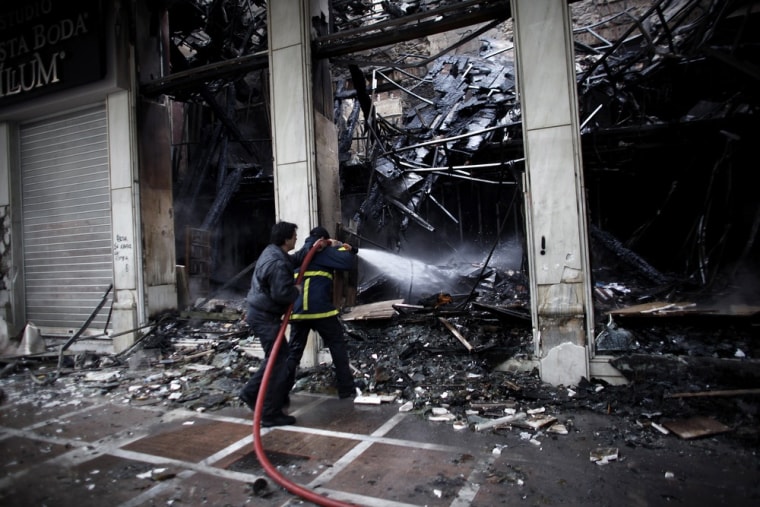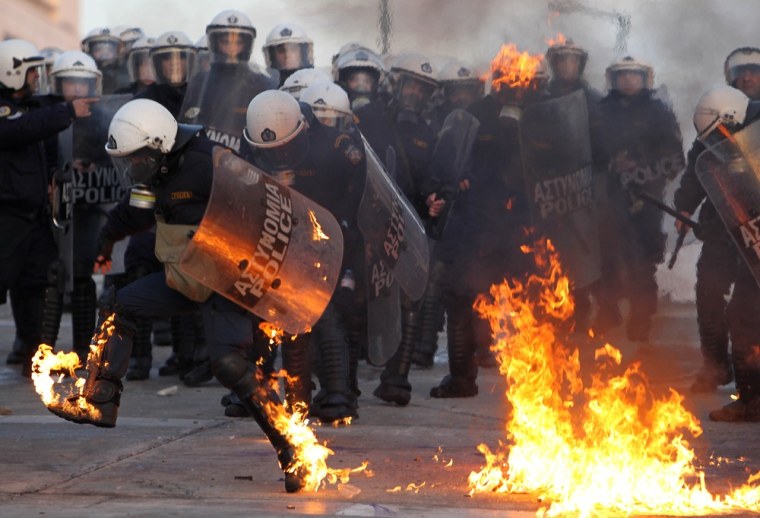Firefighters doused smoldering buildings and cleanup crews swept rubble from the streets of central Athens on Monday following a night of rioting during which lawmakers approved harsh new austerity measures demanded by bailout creditors to save the nation from bankruptcy.
At least 45 buildings were burned, including one of the capital's oldest restored cinemas, while dozens of stores and cafes were smashed and looted.
The stench of tear gas still hung in the air on Monday morning, choking passers-by. More than 120 people were hurt in the rioting. Authorities said 68 police needed medical care after being injured by gasoline bombs, rocks and other objects hurled at them, while at least 70 protesters were also hospitalized.
'Not the way out'
Greeks were shocked to discover Monday that the burnt structures included the neo-classical home to the Attikon cinema dating from 1870.
"We are all very angry with these measures but this is not the way out," said Dimitris Hatzichristos, 30, a public sector worker surveying the debris.
Police arrested at least 67 people, while in several cases they had to escort fire crews to burning buildings after protesters prevented access.
Reuters reported that violence also erupted in Greece's second-largest city Thessaloniki and on the islands of Corfu and Crete.
The rioting began Sunday afternoon ahead of a historic vote in Parliament on yet more austerity measures. Lawmakers approved the bill in a 199-74 vote, to the relief of investors who pushed the Athens stock index up 5 percent on Monday.

There was nevertheless strong dissent among the majority Socialists and rival Conservatives, who along with a small right-wing party make up Greece's interim coalition government. The parties disciplined the dissenters in their ranks, with the Socialists and Conservatives expelling 22 and 21 lawmakers respectively, reducing their majority in the 300-member parliament from 236 to 193.
"We are facing destruction. Our country, our home, has become ripe for burning, the center of Athens is in flames," conservative lawmaker Costis Hatzidakis told parliament. "We cannot allow populism to burn our country down."
"Night of terror inside and outside the parliament," conservative daily Eleftheros Typos wrote on its front page.
Sunday's clashes erupted after more than 100,000 protesters marched to the parliament to rally against the drastic cuts, which will ax one in five civil service jobs and slash the minimum wage by more than a fifth.
The vote paves the way for Greece's international creditors to release €130 billion ($172 billion) in new rescue loans to prevent the country from a potentially catastrophic default next month — bankruptcy could push Greece out of Europe's euro currency union, drag down other troubled eurozone countries and further roil global markets.
Skeptical creditors
The deal, which has not yet been finalized, will be combined with a massive bond swap deal to write off half the country's privately held debt, reducing Greece's debt load by about €100 billion.
But for both deals to materialize, Greece has to persuade its deeply skeptical creditors that it has the will to implement spending cuts and public sector reforms that will end years of fiscal profligacy and tame gaping budget deficits.

Eurozone finance ministers are to meet on Wednesday to approve the plan, after refusing to do so during a meeting last week, saying Athens had to first approve the new austerity measures.
Before signing off on the bailout, the eurozone ministers will still want Greek political leaders to commit in writing to uphold the austerity plan even after the general election in April.
Finance Minister Evangelos Venizelos insisted the country's economic survival hinged on the passage of the new measures.
"The question is not whether some salaries and pensions will be curtailed, but whether we will be able to pay even these reduced wages and pensions," he said in parliament before the vote. "When you have to choose between bad and worse, you will pick what is bad to avoid what is worse."
The further cuts come after two years of deep spending cuts and repeated tax hikes that have sent unemployment soaring to more than 20 percent and left the country struggling through a fifth year of recession.
Those measures were taken in return for a first, €110 billion ($145 billion) package of rescue loans from other eurozone countries and the International Monetary Fund, but despite the cutbacks, Greece repeatedly failed to meet its fiscal targets in reducing its debt and deficit and increasing economic competitiveness.